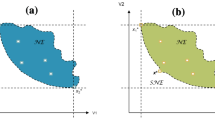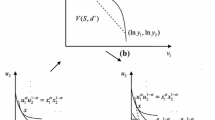Abstract
This paper presents a novel approach for computing the Kalai–Smorodinsky bargaining equilibrium for continuous time and discrete states Markov chains games. To solve the bargaining situation we set the disagreement point as the Nash equilibrium of the problem, then to find the new agreement point we follow the bargaining model presented by Kalai–Smorodinsky employing the utopia point concept. We exemplify the game formulation in terms of nonlinear programming equations implementing the Lagrange principle. The Tikhonov’s regularization method is applied to ensure the convergence of the cost-functions to an equilibrium point. For solving the problem we use a programming method implemented by the extraproximal optimization approach. The proposed method is validated by a numerical example related to the labor market problem for a three-person bargaining problem.






Similar content being viewed by others
References
Alexander, C. (1992). The Kalai–Smorodinsky bargaining solution in wage negotiations. The Journal of the Operational Research Society, 43(8), 779–786.
Anant, T. C. A., Mukherji, B., & Basu, K. (1990). Bargaining without convexity: Generalizing the Kalai–Smorodinsky solution. Economics Letters, 33(2), 115–119.
Antipin, A. S. (1997a). Equilibrium programming: Gradient-type methods. Avtomatika i Telemekhanika, 8, 166–178.
Antipin, A. S. (1997b). Equilibrium programming: Proximal methods. Computational Mathematics and Mathematical Physics, 37(11), 1285–1296.
Antipin, A. S. (2005). An extraproximal method for solving equilibrium programming problems and games. Computational Mathematics and Mathematical Physics, 45(11), 1893–1914.
Antipin, A. S., Artem’eva, L. A., & Vasil’ev, F. P. (2011). Extrapmethods method for solving two-person saddle-point games. Computational Mathematics and Mathematical Physics, 51(9), 1472–1482.
Driesen, B., Perea, A., & Peters, H. (2011). The Kalai–Smorodinsky bargaining solution with loss aversion. Mathematical Social Sciences, 61(1), 58–64.
Dubra, J. (2001). An asymmetric Kalai–Smorodinsky solution. Economics Letters, 73(2), 131–136.
Guo, X., & Hernández-Lerma, O. (2009). Continuous-time Markov decision processes: Theory and applications. Berlin: Springer.
Kalai, E., & Smorodinsky, M. (1975). Other solutions to Nashs bargaining problem. Econometrica, 43(3), 513–518.
Köbberling, V., & Peters, H. (2003). The effect of decision weights in bargaining problems. Journal of Economic Theory, 110(1), 154–175.
Moulin, H. (1984). Implementing the Kalai–Smorodinsky bargaining solution. Journal of Economic Theory, 33(1), 32–45.
Nash, J. F. (1950). The bargaining problem. Econometrica, 18(2), 155–162.
Nash, J. F. (1951). Non-cooperative games. Annals of Mathematics, 54, 286–295.
Peters, H., & Tijs, S. (1984). Individually monotonic bargaining solutions for n-person bargaining games. Methods of Operations Research, 51, 377–384.
Poznyak, A. S. (2008). Advance mathematical tools for automatic control engineers. Volume 1 deterministic techniques. Amsterdam: Elsevier.
Poznyak, A. S. (2009). Advance mathematical tools for automatic control engineers. Volume 2 stochastic techniques. Amsterdam: Elsevier.
Poznyak, A. S., Najim, K., & Gomez-Ramirez, E. (2000). Self-learning control of finite markov chains. New York: Marcel Dekker Inc.
Raiffa, H. (1953). Arbitration schemes for generalized two-person games. Annals of Mathematics Studies, 28, 361–387.
Roth, A. E. (1979). An impossibility result converning n-person bargaining games. International Journal of Game Theory, 8(3), 129–132.
Tanaka, K. (1989). The closest solution to the shadow minimum of a cooperative dynamic game. Computers & Mathematics with Applications, 18(1–3), 181–188.
Tanaka, K., & Yokoyama, K. (1991). On \(\epsilon \)-equilibrium point in a noncooperative n-person game. Journal of Mathematical Analysis and Applications, 160, 413–423.
Trejo, K. K., Clempner, J. B., & Poznyak, A. S. (2015). Computing the Stackelberg/Nash equilibria using the extraproximal method: Convergence analysis and implementation details for Markov chains games. International Journal of Applied Mathematics and Computer Science, 25(2), 337–351.
Trejo, K. K., Clempner, J. B., & Poznyak, A. S. (2017). Computing the strong \(l_p\)-nash equilibrium for markov chains games: Convergence and uniqueness. Applied Mathematical Modelling, 41, 399–418.
Zangwill, W. I. (1969). Nonlinear programming: A unified approach. Englewood Cliffs: Prentice-Hall.
Zangwill, W. I., & Garcia, C. B. (1981). Pathways to solutions, fixed points and equilibria. Englewood Cliffs: Prentice-Hall.
Author information
Authors and Affiliations
Corresponding author
Rights and permissions
About this article
Cite this article
Trejo, K.K., Clempner, J.B. & Poznyak, A.S. Computing the Bargaining Approach for Equalizing the Ratios of Maximal Gains in Continuous-Time Markov Chains Games. Comput Econ 54, 933–955 (2019). https://doi.org/10.1007/s10614-018-9859-9
Accepted:
Published:
Issue Date:
DOI: https://doi.org/10.1007/s10614-018-9859-9




